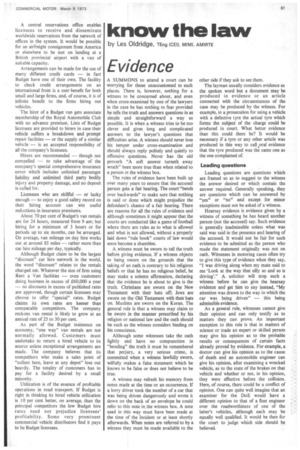know the law
Page 89

If you've noticed an error in this article please click here to report it so we can fix it.
by Les Oldridge, TEng (CS), MIMI, AMIRTE
Evidence
A SUMMONS to attend a court can be worrying for those unaccustomed to such places. There is, however, nothing for a witness to be concerned about, and even when cross-examined by one of the lawyers in the case he has nothing to fear provided he tells the truth and answers questions in as simple and straightforward a way as possible. It is when a witness tries to be too clever and gives long and complicated answers to the lawyer's questions that difficulties arise. A witness should never lose his temper under cross-examination and should always reply politely and quietly to offensive questions. Never has the old proverb "A soft answer turneth away wrath" been more true than when related to a person in the witness box.
The rules of evidence have been built up over many years to ensure that the accused person gets a fair hearing. The court "bends over backwards" to make sure that nothing is said or done which might prejudice the defendant's chance of a fair hearing. There are reasons for all the rules of evidence and although sometimes it might appear that the courts are conducted like a game of football where there are rules as to what is allowed and what is not allowed, without a properly laid down "rule book" courts of law would soon become a shambles.
A .witness must be sworn to tell the truth before giving evidence. If a witness objects to being sworn on the grounds that the taking of an oath is contrary to his religious beliefs or that he has no religious belief, he may make a solemn affirmation, declaring that the evidence he is about to give is the truth. Christians are sworn on the New Testament with their hats off; Jews are sworn on the Old Testament with their hats on. Muslims are sworn on the Koran. The general rule is that a witness may claim to be sworn in the manner prescribed by his religion or national law and the oath should be such as the witness considers binding on his conscience.
Although some witnesses take the oath lightly and have no compunction in "bending" the truth it must be remembered that perjury, a very serious crime, is committed when a witness lawfully sworn, wilfully makes a false statement which he knows to be false or does not believe to be true.
A witness may refresh his memory from notes made at the time or an occurrence. If a lorry driver took the number of a car that was being driven dangerously and wrote it down on the back of an envelope he could refer to this note in. the witness box. A note used in this way must have been made at the time of the incident or at least shortly afterwards. When notes are referred to by a witness they must be made available to the other side if they ask to see them.
The layman usually considers evidence as the spoken word but a document may be produced in evidence or an article connected with the circumstances of the case may be produced by the witness. For example, in a prosecution for using a vehicle with a defective tyre the actual tyre which forms the subject of the charge could be produced in court. What better evidence than this could there be? It would be necessary if a tyre or any other article was produced in this way to call .oral evidence that the tyre produced was the same one as the one complained of.
Leading questions Leading questions are questions which are framed so as to suggest to the witness the answer desired or which contain the answer required. Generally speaking, they are questions which can be answered by "yes" or "no" and except for minor exceptions must not be asked of a witness.
Hearsay evidence is evidence given by a witness of something he has heard another person (not the accused) say. Such evidence is generally inadmissible unless what was said was said in the presence and hearing of the accused. It would not be fair for such evidence to be admitted as the person who made the statement originally was not on oath. Witnesses in motoring cases often try to give this type of evidence when they say, "I was driving along when my mate said to me 'Look at the way that silly so and so is driving'." A. solicitor will stop such a witness before he can give the hearsay evidence and get him to say instead, "My attention was drawn to the way in which the car was being driven" — this being admissible evidence.
As a general rule, witnesses cannot give their opinion and can only testify as to matters they can prove. An important exception to this rule is that in matters of science or trade an expert or skilled person may give his opinion as to the probable results or consequences of certain facts already proved by evidence. For example, a doctor can give his opinion as to the cause of death and an automobile engineer can give his opinion, after examining a wrecked vehicle, as to the state of the brakes on that vehicle and whether or not, in his opinion, they were effective before the collision. Here, of course, there could be a conflict of opinion. One can quite well imagine that an examiner for the DoE would have a different opinion to that of a fleet engineer over the roadworthiness of one of the latter's vehicles, although each may be equally well qualified. It would be then for the court to judge which side should be believed.




















































































































































